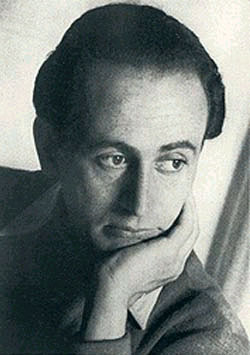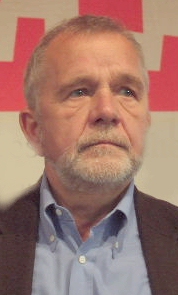
Martin Heidegger was a German philosopher who is best known for contributions to phenomenology, hermeneutics, and existentialism. He is often considered to be among the most important and influential philosophers of the 20th century.

Max Born was a German-British physicist and mathematician who was instrumental in the development of quantum mechanics. He also made contributions to solid-state physics and optics and supervised the work of a number of notable physicists in the 1920s and 1930s. Born was awarded the 1954 Nobel Prize in Physics for his "fundamental research in quantum mechanics, especially in the statistical interpretation of the wave function".

Ingeborg Bachmann was an Austrian poet and author. She is regarded as one of the major voices of German-language literature in the 20th century.

Johann Christian Friedrich Hölderlin was a German poet and philosopher. Described by Norbert von Hellingrath as "the most German of Germans", Hölderlin was a key figure of German Romanticism. Particularly due to his early association with and philosophical influence on Georg Wilhelm Friedrich Hegel and Friedrich Wilhelm Joseph Schelling, he was also an important thinker in the development of German Idealism.

Paul Celan, born Paul Antschel, was a Romanian poet and translator, regarded as one of the major German-language poets of the post-World War II era. His poetry is characterized by a complicated and cryptic style that deviates from poetic conventions.

Ernst Alfred Cassirer was a German philosopher. Trained within the Neo-Kantian Marburg School, he initially followed his mentor Hermann Cohen in attempting to supply an idealistic philosophy of science.

Karl-Otto Apel was a German philosopher and Professor Emeritus at the University of Frankfurt am Main. He specialized on the philosophy of language and was thus considered a communication theorist. He developed a distinctive philosophical approach which he called "transcendental pragmatics."
Architectural phenomenology is the discursive and realist attempt to understand and embody the philosophical insights of phenomenology within the discipline of architecture. The phenomenology of architecture is the philosophical study of architecture employing the methods of phenomenology.
Gottfried Boehm is a German art historian and philosopher.
Aletheia or Alethia is truth or disclosure in philosophy. Originating in Ancient Greek philosophy, the term was explicitly used for the first time in the history of philosophy by Parmenides in his poem On Nature, in which he contrasts it with doxa.
Martin Heidegger, the 20th-century German philosopher, produced a large body of work that intended a profound change of direction for philosophy. Such was the depth of change that he found it necessary to introduce many neologisms, often connected to idiomatic words and phrases in the German language.
Heidegger Gesamtausgabe is the title of the collected writings of German philosopher Martin Heidegger (1889-1976), published by Vittorio Klostermann.

Ludwig Binswanger was a Swiss psychiatrist and pioneer in the field of existential psychology. His parents were Robert Johann Binswanger (1850–1910) and Bertha Hasenclever (1847–1896). Robert's German-Jewish father Ludwig "Elieser" Binswanger (1820–1880) was founder, in 1857, of the Bellevue Sanatorium in Kreuzlingen. Robert's brother Otto Binswanger (1852–1929) was a professor of psychiatry at the University of Jena.

Karl-Markus Gauß is an Austrian contemporary writer, essayist and editor. He lives in Salzburg.
In the philosophy of religion and theology, post-monotheism is a term covering a range of different meanings that nonetheless share concern for the status of faith and religious experience in the modern or post-modern era. There is no one originator for the term. Rather, it has independently appeared in the writings of several intellectuals on the Internet and in print. Its most notable use has been in the poetry of Arab Israeli author Nidaa Khoury, and as a label for a "new sensibility" or theological approach proposed by the Islamic historian Christopher Schwartz.

Rüdiger Safranski is a German philosopher and author.
Albert Hofstadter was an American philosopher.
Wolfgang Schadewaldt was a German classical philologist working mostly in the field of Greek philology and a translator. He also was a professor of University of Tübingen and University of Freiburg.

Robert Ludwig Kahn was a German-American scholar of German studies and poet. He grew up in Nuremberg and Leipzig as the son of Jewish parents who sent him abroad to England on a Kindertransport in 1939. After the end of World War II, Kahn learned his parents had perished in the Holocaust, which was a traumatic experience that caused him to lose his faith. He never recovered from survivor guilt.

Max Kommerell was a German literary historian, writer, and poet. A member of the Stefan George circle from 1921 to 1930, Kommerell was a prominent literary critic associated with the Conservative Revolutionary movement in the Weimar Republic and subsequently a leading intellectual in Nazi Germany and a member of the Nazi Party from 1941, though one of his works was banned by the Nazi government in 1943.












